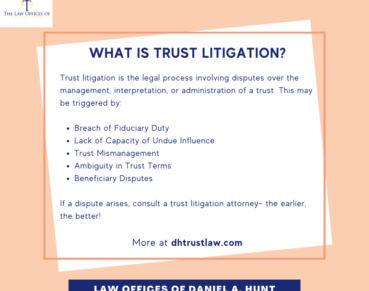Inheritance Hijacking: What it is and How to Protect Yourself
Inheritance hijacking may seem like the plot of a dramatic movie. Despite the theatrical name, inheritance hijacking does happen in real life and can cause extensive damage to victims. Inheritance hijacking occurs when one or more people steal an inheritance intended to be left to someone else. Understanding what inheritance hijacking means, how it happens, and how to protect yourself and your estate will help you in the future. Some of the most common types of inheritance hijacking include the following situations.
Undue Influence Over an Elderly or Ill Individual
Helping an elderly loved one is a way to show support and love during a difficult time. Unfortunately, there have been many cases in which an unethical person becomes close to an elderly or ill individual hoping to steal an inheritance. For example, a distant cousin may begin exerting undue influence over an individual. The cousin may convince the individual to change their will and name them as an heir.
In some cases, an unethical person will threaten an elderly or ill individual to pressure them to change their will. Perhaps the person exerting influence will threaten to stop feeding or caring for the individual unless they acquiesce.
Alternatively, the person exerting influence may begin telling the individual lies or toxic information about other family members in an attempt to steal the inheritance. Aging individuals with memory challenges from Alzheimer’s or dementia are particularly vulnerable to this type of inheritance hijacking.
Undocumented Loans
When an elderly relative decides to give a loan to a family member to help him or her out, the loan may not be documented. Perhaps the loan was a verbal agreement, or the written agreement is buried in a file cabinet, and nobody else knows about it.
The family member who received the loan may deny that the loan existed or falsely claim that the deceased individual gave him or her the money as a gift and not a loan. The other heirs may not realize what money is missing, or they may not be able to prove what happened.
Theft
Many cases of inheritance hijacking involve some sort of trickery or deceit. In some cases, a thief will engage in an obvious and blatant inheritance theft. It is not unheard of for a distant relative, friend, employee, made, or healthcare professional to begin stealing valuables from a vulnerable person. They may steal antiques or jewelry from a vulnerable person’s home before, during, or after the funeral.
After reading the obituaries, a burglar may target a victim, but theft is more common among people the deceased individual knew.
In some cases, a family member who expected to inherit money and was not named in the will takes revenge by stealing property from the deceased. In other cases, a longtime caregiver who feels like the deceased did not pay them enough may decide to steal objects as a type of severance payment.
Marriage Made Under False Pretenses
Due to community property laws, spouses of deceased individuals are entitled to part of the estate under California law. Unscrupulous individuals may attempt to marry someone under false pretenses to steal an inheritance from someone else. They may marry a wealthy individual to benefit from their passing financially. The new spouse may use undue influence to pressure the individual to cut the rest of the family out of the will. As a result, the family members who would have inherited the estate will not inherit anything.
Abuse of Power of Attorney
As mentioned above, individuals with memory issues, illnesses, and the elderly are more vulnerable to inheritance hijacking. They may decide to give a person they trust a power of attorney over their financial affairs. Even though the financial agent has a legal duty to use the property responsibly, for the benefit of their owner, they may decide to squander the property.
There have been cases in which financial agents use the assets of someone else to pay their bills, purchase luxury items, go on vacation, and otherwise benefit themselves. After the decedent’s death, the rightful heirs may be shocked to learn that the financial agent spent all of their inheritance by using a power of attorney to make devastating financial decisions.
Theft or Document Forgery
When a family member knows that he or she has been cut out of the will of a wealthy individual, they may engage in criminal inheritance hijacking behavior. A trusted adviser or family member may create a fake last will and testament or a fake codicil (amendment) to the person’s actual will. The forged documents may give the forger a significant share of the estate that they would not have inherited otherwise.
This scenario puts the rightful heirs in a difficult position. They will need to prove that the will or amendment was forged.
Protecting Yourself Against Inheritance Hijacking
One of the best ways to protect yourself from estate hijacking is to discuss your estate plan with an experienced attorney regularly. Estate planning documents that a skilled lawyer creates are more likely to protect you and your heirs.
You may wish to give your assets to your heirs before you die, ensuring that you see them distributed as you desire. You can work with an attorney and tax preparer to minimize tax issues created by giving large gifts.
If you are concerned about inheritance hijacking or do not fully trust anyone in your inner circle to function as your successor, consider using a professional fiduciary. See our firm’s Referral Hub for a referral to an experienced professional fiduciary.
Contact a Skilled Estate Planning Lawyer
Thieves are getting more creative at hijacking other people’s inheritances. At the Law Offices of Daniel A. Hunt, we have helped many Sacramento-area clients protect themselves from inheritance hijacking. Contact us today to learn more about how we can protect your hard-earned assets with our estate planning services.
Law Offices of Daniel A. Hunt
The Law Offices of Daniel A. Hunt is a California law firm specializing in Estate Planning; Trust Administration & Litigation; Probate; and Conservatorships. We've helped over 10,000 clients find peace of mind. We serve clients throughout the greater Sacramento region and the state of California.




